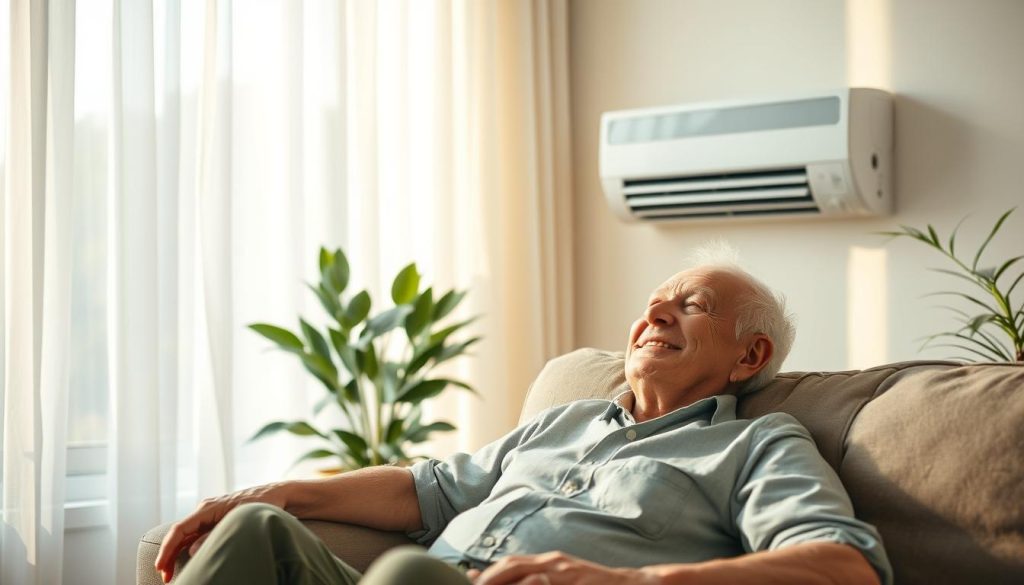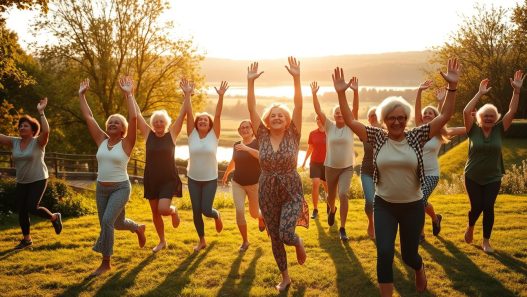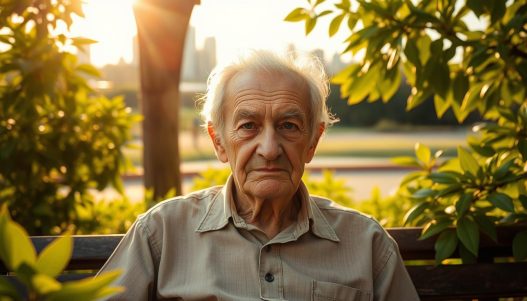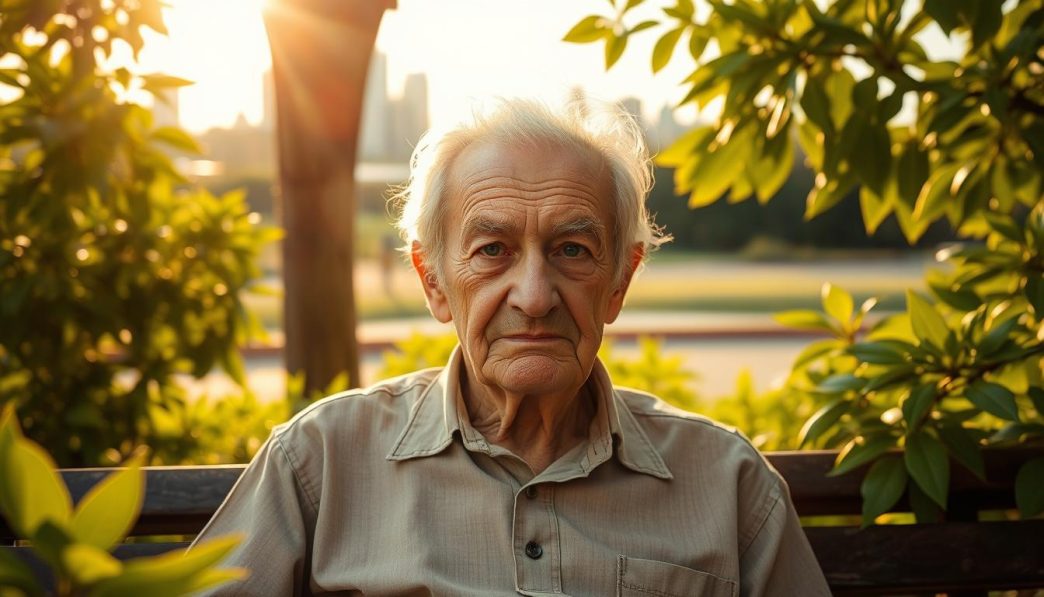As the world’s population ages, it’s vital to understand how extreme temperatures affect older adults. Studies reveal that temperature impacts longevity and health in seniors. This makes heat resilience key to keeping them healthy and independent.
Rising summer temperatures are a big challenge for older adults, especially those with health issues. It’s crucial to learn how summer temperatures affect the aging population. We must find ways to promote longevity and help them stay healthy.
Key Takeaways
- Temperature affects health and longevity in older adults.
- Heat resilience is crucial for maintaining health and independence.
- Older adults with pre-existing health conditions are more vulnerable to extreme temperatures.
- Understanding the impact of summer temperatures on aging is essential.
- Promoting longevity requires measures to mitigate the effects of extreme heat.
The Growing Concern: Heat and Aging Population
Climate change is making heat waves worse, posing big risks to older adults. As temperatures go up, older people face more danger from heat-related illnesses. This makes it a big worry.
Climate Change and Increasing Heat Waves
Heat waves are happening more often and getting stronger because of climate change. Experts say this will keep getting worse, with even more severe heat in the future. Older adults are especially at risk from these heat waves.
Demographic Shifts: An Aging America
The U.S. is seeing a big change, with more older people. By 2030, one in five Americans will be 65 or older. This means older people are more likely to get sick from heat, so we need to know how to protect them.
Why Older Adults Face Greater Heat Risks
Older adults are more at risk from heat because of changes as we age and health issues. Some reasons include:
- It’s harder for them to keep their body temperature stable
- Health problems can get worse in the heat
- Some medicines can make it harder for the body to cool down
It’s important to understand these risks to help keep older adults safe from heat waves.
Understanding Heat Vulnerability in Older Adults
Older adults face a higher risk of heat-related illnesses. This is due to age-related changes and external factors. As people get older, their bodies change in ways that affect temperature regulation.
Age-Related Physiological Changes
As we age, our bodies cool less efficiently. This is because we sweat less and our heart and blood vessels change. These changes raise the risk of heat-related illnesses.
Reduced Thermoregulation Capacity
Thermoregulation helps keep our body temperature stable. Older adults often struggle with this. It’s harder for them to cool down when it’s hot.
Medication Interactions with Heat
Many older adults take several medications. Some can be dangerous in the heat. They can make it harder for the body to cool down or lead to dehydration.
Common Medications That Increase Heat Sensitivity
Medications like diuretics, antidepressants, and blood pressure meds can make you more sensitive to heat. It’s important for older adults to know these risks.
How to Manage Medications During Heat Waves
Older adults should talk to their doctors about medication risks during heat waves. Drinking plenty of water and watching body temperature are also important.
“According to the CDC, older adults are at higher risk for heat-related illnesses due to decreased mobility, chronic health conditions, and medications that can affect the body’s ability to regulate temperature.”
Staying cool and hydrated is key to preventing heat-related illnesses.
Heat Resilience and Aging: How Summer Temperatures Affect Longevity
Rising summer temperatures are a big health risk for older adults. It’s key to have heat resilience strategies. As the climate changes, it’s vital to understand how extreme heat affects older people. This helps in creating better public health plans.
Direct Health Impacts of Extreme Heat
Extreme heat can severely harm older adults. It can cause heat exhaustion and heat stroke. These happen when the body can’t cool down, leading to high body temperature.
- Heat exhaustion symptoms include heavy sweating, pale skin, fast and weak pulse, nausea or vomiting, and dizziness.
- Heat stroke is a more severe condition characterized by a body temperature of 103°F or higher, confusion, and loss of consciousness.
Long-term Effects on Life Expectancy
Research shows that extreme heat can harm life expectancy over time. Chronic heat stress can worsen existing health issues. This leads to a decline in overall health and well-being.
Research Findings on Heat and Mortality Rates
Studies link extreme heat events to higher mortality rates in older adults. Those living in cities or with health issues are hit harder.
Vulnerable Populations and Risk Factors
Some factors raise the risk of heat-related illnesses in older adults. These include:
- Age-related physiological changes
- Chronic medical conditions
- Medications that affect thermoregulation
- Social isolation
Recognizing Heat-Related Health Risks for Seniors
When it gets hot, seniors face serious health risks. These risks can be deadly if not caught early. Older adults are more at risk because of changes in their bodies and health conditions.
Heat Exhaustion vs. Heat Stroke: Knowing the Difference
Heat exhaustion and heat stroke are two dangerous heat-related illnesses. Heat exhaustion shows as heavy sweating, pale skin, and a fast, weak pulse. It also includes nausea, vomiting, and dizziness.
If not treated, it can turn into heat stroke. This is a serious condition where the body can’t cool itself down. It leads to a body temperature of 103°F or higher.
Cardiovascular Strain During Hot Weather
Hot weather is hard on the heart, especially for seniors with heart problems. The body tries to cool down by increasing heart rate and blood pressure. This can make heart issues worse.
Dehydration: Symptoms and Complications
Dehydration is a big risk in the heat, especially for older adults. Signs include dry mouth, dark urine, dizziness, and feeling tired. If ignored, dehydration can cause serious problems like kidney stones and infections.
When to Seek Medical Attention
If heat exhaustion or dehydration symptoms get worse, or if you see signs of heat stroke, get help right away. Immediate medical attention is necessary. Quick action can prevent serious damage and save lives.
Chronic Conditions Exacerbated by Heat
Extreme heat can make chronic conditions worse, especially for older adults. As temperatures go up, those with health issues need to watch their health closely.
Diabetes Management in Hot Weather
Heat can change blood sugar levels and how well insulin works for people with diabetes. It’s important to drink plenty of water and check blood sugar often when it’s hot.
Respiratory Conditions and Heat Sensitivity
Those with COPD or asthma might see their symptoms get worse in the heat. To help, stay cool and avoid going outside when it’s hottest.
Cognitive Impacts of Heat Stress
Heat stress can cause confusion and lower mental sharpness. Older adults, especially those with dementia, need careful watching during heat waves.
Heart Disease and Heat Precautions
People with heart disease should be extra careful in the heat. Heat can make the heart work harder. Drinking water and avoiding hard work are important steps.
| Chronic Condition | Heat-Related Risks | Management Tips |
|---|---|---|
| Diabetes | Dehydration, blood sugar fluctuations | Monitor blood glucose, stay hydrated |
| Respiratory Conditions | Worsening of symptoms | Stay cool, avoid peak heat outdoors |
| Heart Disease | Cardiovascular strain | Stay hydrated, avoid strenuous activities |
7 Essential Hydration Strategies for Older Adults
Dehydration can be very dangerous for older adults. It’s important to find ways to stay hydrated. As we get older, our bodies change, making it harder to keep fluids balanced.
Beyond Water: Optimal Hydration Sources
Water is key, but older adults can also get hydration from other sources. Herbal teas, diluted fruit juices, and foods like cucumbers and watermelon are good. They add important electrolytes and make drinking water more fun.
Electrolyte Balance and Why It Matters
Electrolytes like sodium, potassium, and calcium are crucial for staying hydrated. Older adults need to watch their electrolyte intake, especially when it’s hot. This helps avoid health problems caused by imbalance.
Creating a Daily Hydration Schedule
Having a routine helps older adults stay hydrated. Drinking water at set times or with meals is a good start.
Monitoring Hydration Status
Checking urine color is a simple way to see if you’re hydrated. It should be pale yellow. Feeling dizzy or having a dry mouth are signs you might need more water. Checking regularly helps catch dehydration early.
Using these hydration tips, older adults can lower their risk of dehydration. This is especially important during hot weather.
Creating Heat-Safe Living Environments
Heatwaves are becoming more common. It’s vital to make our homes safer from heat. This is especially true for older adults to avoid heat-related illnesses.
No-Cost and Low-Cost Cooling Strategies
There are many ways to cool your home without spending a lot. Here are a few:
- Using fans to circulate air
- Keeping curtains and blinds closed during the hottest parts of the day
- Utilizing natural ventilation by opening windows at night
- Employing cool bedding and clothing
Energy-Efficient Cooling Options
Choosing energy-efficient cooling can save money and keep you cool. Some good choices are:
- Installing energy-efficient air conditioners
- Using smart thermostats to optimize cooling
- Employing evaporative cooling systems in dry climates
Heat-Resistant Home Modifications
Long-term changes can make your home more resistant to heat. Think about:
- Upgrading insulation to prevent heat gain
- Installing heat-resistant window treatments
Window Treatments and Insulation Tips
Good window treatments and insulation help keep your home cool. Here are some tips:
- Using reflective window films to reduce heat gain
- Installing thermal curtains or shades
- Ensuring attic insulation is adequate and properly installed
By using these tips, you can make your home safer from extreme heat.
Community Resources and Support Systems
During heat waves, community resources and support systems are key for older adults. They help keep them safe and comfortable.
Finding and Utilizing Cooling Centers
Cooling centers offer a cool place to escape the heat. Older adults can go there to cool off. Many communities list cooling centers on their official websites or through local health departments.
Neighbor Check-In Programs
Neighbor check-in programs involve regular visits or calls to older adults living alone. This support helps find those who need help during a heat wave.
Emergency Heat Response Services
Some communities have emergency heat response services. They provide quick help during extreme heat. This can include rides to cooling centers or medical aid.
Transportation Options During Heat Waves
For older adults without cars, community transport can help. It offers rides to cooling centers or other important places during heat waves.
Using these community resources and support, older adults can handle heat waves better.
Technology Solutions for Heat Management
New tech is changing how older adults deal with hot weather. It helps them stay safe and independent.
Heat Alert Apps and Systems
Heat alert apps send out warnings and important info during hot spells. Apps like Weather Underground and Dark Sky give detailed weather forecasts. This helps seniors plan their days safely.
Wearable Temperature and Hydration Monitors
Devices like Fitbit and Garmin track important health signs and how much water you drink. They warn you of health dangers, so you can act fast.
Smart Home Cooling Solutions
Smart thermostats like Nest and Ecobee make cooling your home better. They save energy and keep your home cool and safe.
Budget-Friendly Tech Options
If you’re watching your budget, there are free or cheap apps like Weather Alert. There are also affordable wearables for managing heat.
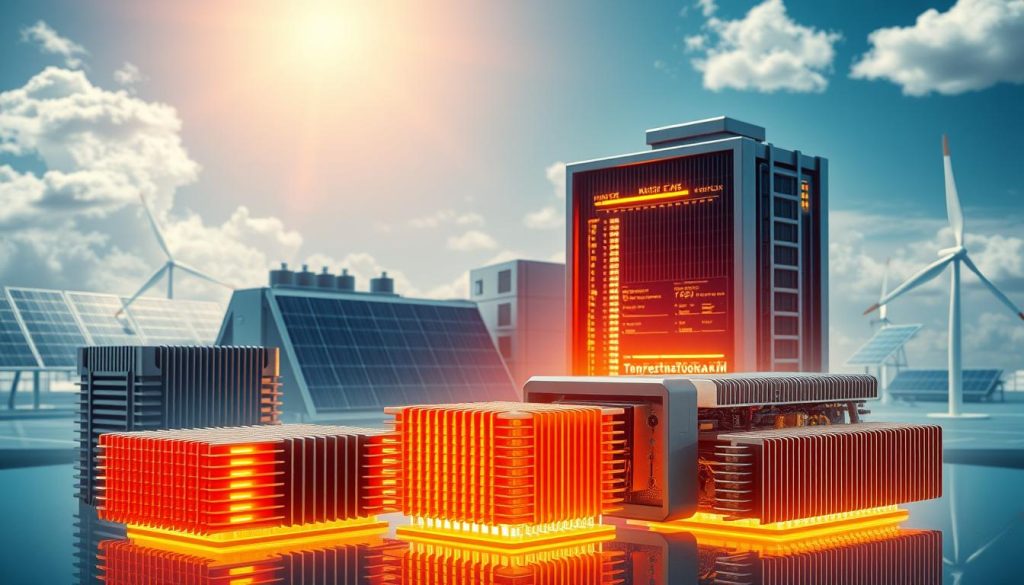
Using these tech solutions, older adults can stay safe and cool. They make living through hot weather easier and more comfortable.
5 Exercise Adaptations for Hot Weather
Staying active is key, and older adults can do this by tweaking their workouts for hot weather. Making these changes helps avoid heat risks while keeping their health up.
Timing Your Activities for Safety
One easy way to stay safe in the heat is to pick the right time for your workouts. Avoid exercising during the hottest part of the day (usually between 11 am and 3 pm). Choose early morning or late evening when it’s cooler.
Indoor Exercise Alternatives
When it’s too hot outside, try indoor exercises. Yoga, Pilates, or brisk walking on a treadmill are great ways to stay active without the heat.
Water-Based Activities for Cooling
Water activities are fun and cool you down naturally. Swimming or water aerobics are perfect for older adults. They’re low-impact and keep you cool.
Monitoring Exertion in Heat
It’s important to watch how hard you’re working in the heat. Listen to your body and stop if you feel dizzy, nauseous, or have headaches.
Seasonal Heat Preparedness Planning
Preparing for the heat is key to keeping seniors safe in the summer. Being ready can lower the chance of heat sickness in older adults.
Spring Preparation Checklist
Here’s a checklist to get ready for the heat:
- Check and maintain air conditioning units
- Ensure windows and doors are sealed properly
- Stock up on necessary supplies like water and non-perishable food
- Create a list of emergency contact numbers
Creating a Heat Emergency Plan
Older adults need a heat emergency plan. It should include:
- Identifying nearby cooling centers
- Establishing a communication plan with family and caregivers
- Knowing the signs of heat-related illnesses
Assembling a Heat Wave Kit
A heat wave kit should have:
| Item | Description |
|---|---|
| Water | At least 1 gallon per person per day |
| Non-perishable food | Easy-to-prepare meals |
| First aid kit | Basic medical supplies |
Financial Assistance Programs for Cooling
There are programs to help with cooling costs. These include:
“Programs like LIHEAP (Low-Income Home Energy Assistance Program) can provide financial assistance to eligible households to help with energy bills, including cooling costs.”
It’s important to look into these options to stay cool during heat waves.
Conclusion: Embracing Longevity Through Heat Resilience
As we face climate change, it’s key for older adults to stay healthy and independent. They can do this by understanding and managing heat risks. This helps them live longer and better.
Being heat resilient means more than just getting through hot spells. It’s about enjoying life even when it’s hot. Older adults can do this by making their homes safe, drinking plenty of water, and knowing about heat sickness. Also, having community support is crucial for dealing with extreme heat.
By using the tips from this article, older adults can lower their risk of heat problems. This keeps their life quality high. Let’s make sure to focus on heat resilience as we age.
